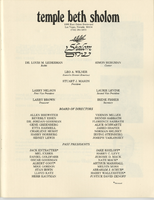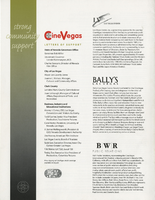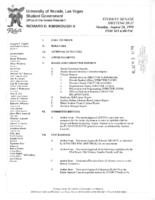Search the Special Collections and Archives Portal
Search Results
Benedict Family Papers
Identifier
Abstract
The Benedict Family Papers materials date from roughly 1905-1998 and are comprised of correspondence and letters (1969-1971) written to Howard Hughes by the public. The collection also contains correspondence written to Robert Maheu, former chief executive of Nevada operations for Howard Hughes. The collection also includes a variety of casino and gambling related product catalogs, gaming guides for Las Vegas casinos, and of research papers and reports primarily relating to sports betting and cheating.
Archival Collection
Michael McKensie Pratt Professional Papers
Identifier
Abstract
The Michael McKensie Pratt Professional Papers (approximately 1950-2021) contain costume designs, musical selections, and synopsis for shows that Pratt worked on in Las Vegas, Nevada including 90 Degrees & Rising, Les Folies Chic, and Jubilee!. The collection also contains souvenir show programs for cabaret shows performed in Paris, France and Las Vegas, Nevada, including
Archival Collection
Donn Arden Papers
Identifier
Abstract
The Donn Arden Papers (1910s-1990s) document Arden's sixty-plus years in the entertainment industry working in showrooms and nightclubs all over the world including Paris, France, Las Vegas, Nevada, New York, New York, and Los Angeles, California. Donn Arden worked as a choreographer, producer and director known for creating extravagant production shows that combined spectacular scenery and disaster with sequined and feathered showgirls. The collection is comprised of production notes, programs, photographs, posters, sheet music, correspondence, costume design sketches, press clippings, and magazine articles.
Archival Collection

Program from event commemorating retirement of Leo Wilner as Executive Director of Temple Beth Sholom, 1984
Date
Archival Collection
Description
Program booklet for the testimonial dinner held for Leo Wilner's retirement includes dedications from colleagues and friends.
Text

Transcript of interview with Victor Givens by LeGary Stowers, March 15, 1981
Date
Archival Collection
Description
On March 15, 1981, LeGary Stowers interviewed Victor Givens (born 1958 in Las Vegas, Nevada) about his profession in the gaming industry, specifically as a table games dealer. Givens first talks about his family background and then talks about his educational, occupational, and residential histories. He then talks about the various qualities required of individuals who work in the casino industry, his beliefs regarding religion and gambling, and some of the motivations and goals that are present for those within the field of gaming.
Text
Margaret Kelly Collection on the Bluebell Girls
Identifier
Abstract
The Margaret Kelly Collection on the Bluebell Girls (1935-1997) includes personal scrapbooks created by Margaret Kelly, programs from international shows featuring the Bluebell Girls dance troupe, and photographs of the Bluebell Girls. The scrapbooks include newspaper clippings covering Kelly's work at the Folies-Bergère and Lido de Paris, Paris, France, and her long career as creator and manager of the world famous Bluebell Girls. Also included are materials from 1958 about the Bluebell Girls shows in Las Vegas, Nevada.
Archival Collection

Transcript of interview with Fluff LeCoque by Joyce Marshall, May 5, 1997
Date
Archival Collection
Description
This interview is compiled in the bound book version for OH-02270. Born Ffolliott Chorlton in Butte, Montana in 1923, Fluff Le Coque embarked on a career during World War II that would span fifty-five years. Le Coque’s experience as an entertainer started at the age of seven when she began dance lessons during the Great Depression. She expanded her interest in show business at the University of Washington. Attending on a drama scholarship, she performed in theatrical productions and supplemented the scholarship by teaching coordination to university athletes through dance. Le Coque toured as a dancer in a road company during World War II. After the war she came to Las Vegas for the first time. Although she did not consider herself a singer, she performed as a vocalist with the Chuck Gould Orchestra at the Last Frontier. After a brief excursion to Hollywood, she returned to Las Vegas to work at the Thunderbird Hotel as a dancer. It was at the Thunderbird that she became part of the glamour publicity that would help shape the image of Las Vegas. Crowned “Miss Thunderbird,” Le Coque took part in publicity photo shoots designed to attract vacationing customers to the Las Vegas resort casino. While performing at the Thunderbird, Le Coque learned of an opportunity to showcase her talents in a wider arena. She joined a touring company that was preparing to take the production of Hollywood Extravangza to Europe. In Paris, Le Coque took on additional responsibilities in the production end of the business. She served the Hollywood Extravaganza as principal dancer, choreographer, and ballet mistress. On her return to New York, she firmed up her career-long relationship with producers Donn Arden and Ron Fletcher. Le Coque’s association with Arden-Fletcher Productions proved beneficial for an already successful career. She performed as principal dancer for Arden and Fletcher beginning with a six-month engagement at the Lookout House in Cincinnati, Ohio, in the late 1950s Arden wanted her to return to Las Vegas and she accepted immediately. The Las Vegas Desert Inn opened a newly remodeled showroom with Fluff Le Coque as a featured principal dancer. Arden-Fletcher Productions kept a number of performers busy throughout the United States from California to New York. Le Coque, now a valued talent, appeared in the Arden-Fletcher production at the Moulin Rouge in Hollywood. She worked there as company captain and principal dancer for ten years. Following her extended engagement at the Moulin Rouge, she toured the United States and Europe before returning to Las Vegas for good in the late 1960s. Arden again asked her to open a renovated showroom at the Desert Inn and again she agreed. This time Le Coque made Las Vegas her permanent home. She danced until she was forty-five years old and during the later years worked both sides of the stage, as company manager and dancer. Fluff Le Coque retired from dancing in 1970 to enjoy leisure activities and volunteer work. She learned to paint and served as publicity director of the Las Vegas Art Museum. She was wooed out of retirement by Donn Arden, to become company manager of the production show at the new MGM Grand Hotel [later reopened as Bally’s]. At the time of the interview, Le Coque continued to serve as company manager for Jubilee at Bally’s Hotel & Casino. Le Coque’s narrative provides a vivid account of the history of the Las Vegas entertainment industry. In addition to the organization of club circuits during the post-war years, the narrative provides clues about white-black relations during the era. It also informs a wider historical context. Post-war American society underwent significant changes economically, politically, and socially. Expanded work opportunities for women were among those changes. Le Coque’s choice to complete a college education during the 1940s was atypical. Her successful dancing career and later move into production management provides an example of career achievement decades ealier than the majority of American women. By extending her career as a dancer into her forty-fifth year, she resisted the evolving publicity hype that only an ingenue could be a dancer. Her narrative provides a compelling description of both the glamour and physical demands associated with the Las Vegas entertainment industry.
Text
Sands Hotel Photograph Collection
Identifier
Abstract
The Sands Hotel Photograph Collection depicts entertainers, celebrities, events, amenities, and staff at the Sands Hotel in Las Vegas, Nevada from approximately 1952 to 1980. The photographs primarily depict entertainers like Frank Sinatra, Dean Martin, and the Copa Girls performing in the Copa Room, the showroom of the Sands Hotel. The photographs also depict patrons gambling, events held in the Sands Hotel's ballrooms, banquets, the pool, rooms in the hotel, as well as Jack Entratter, the hotel'’s director of entertainment.
Archival Collection

Prospectus for the premier of CineVegas, December 1998
Date
Archival Collection
Description
A prospectus for the premier of CineVegas, an international film festival held in Las Vegas, Nevada.
Text

Meeting minutes for Consolidated Student Senate University of Nevada, Las Vegas, August 24, 1998
Date
Archival Collection
Description
Text
